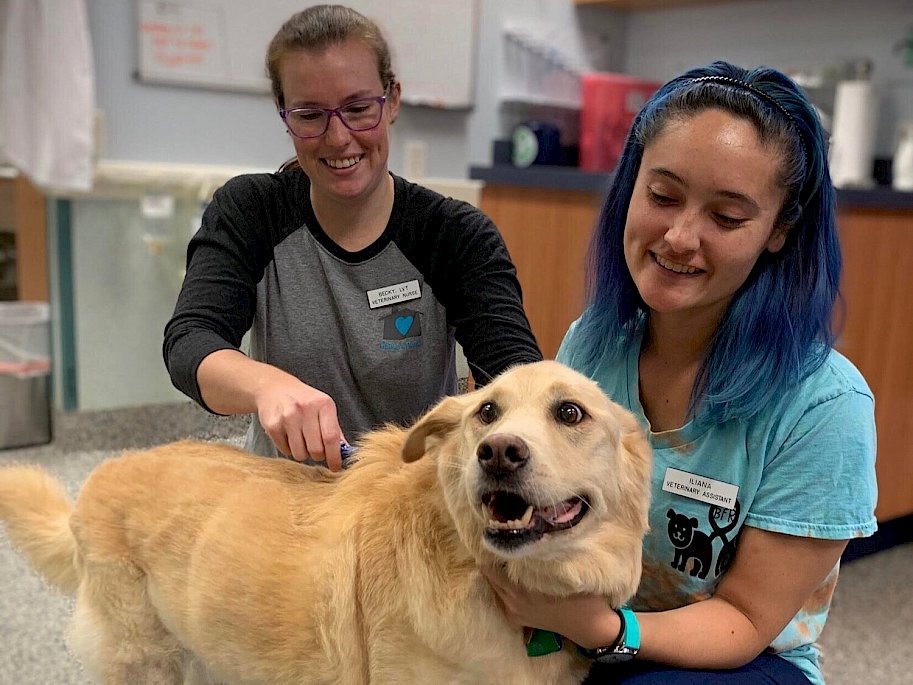Microchipping and Other Ways to Find Missing Pets
According to the American Animal Hospital Association (AAHA), one out of three pets goes missing during their lifetimes.
Any pet parent who has been through a search for a dog or cat who has disappeared knows how scary and exhausting the process can be. And, the experience can also be quite traumatic for your furry friend.
The sooner that a pet can be reunited with its family, the better. Homemade flyers with the pet's photo and the owner's contact info are still an effective way to get the word out; however, there are many more options today thanks to technological advances. At Bees Ferry Veterinary Hospital, we recommend that you take the proper steps now to help you and the local community to be an active part of a search should your pet go missing.
"In our study of 53 shelters who recorded information on animals entering a shelter with a microchip, we found that 73% of stray dogs and cats were found."
- OSU College of Veterinary Medicine, indoorpet.osu.edu/veterinarians/microchip
Microchipping

A microchip is your pet's permanent ID, and it is invaluable if someone finds your lost pet and takes it to an animal hospital, vet clinic, or local shelter with a microchip scanner.
About the Procedure: Dog and cat microchipping is a simple procedure. A veterinarian simply injects a microchip for pets (about the size of a grain of rice) beneath the surface of your pet's skin between the shoulder blades. The process is similar to an injection and takes only a few seconds. An anesthetic is usually not required.
How a Microchip Works: The microchip itself has no internal energy source, so it will last the life of your pet. It is read by passing a microchip scanner over the pet's shoulder blades. The scanner emits a low radio frequency that provides the power necessary where the chip is located to transmit the microchip's unique cat or dog ID code and positively identify your pet. This permanent ID can never be removed or become impossible to read.
Keep Your Contact Info Updated: Details of all microchipped animals are maintained in a central database that can be accessed 24/7. Regularly updating contact information on the pet's microchip is almost as important as implanting the chip itself. If someone does find your lost pet and take it to be scanned, an outdated phone number and address won't be of much use. You will need to know which registry your chip maker uses in order to keep your info updated, and your veterinarian can scan the chip to access this information for you if you don't know. At BFVH, we use HomeAgain.
Other Ways to Find Missing Pets
Microchipping your pet is a very important step to take, but keep in mind that a microchip is not a GPS tracking device. It is only effective if your pet is found and taken to a facility with a microchip scanner. Oftentimes, you can be reunited with a missing pet quickly simply by leveraging the following methods.
-
Pet Collars with GPS Tracking - Pet Life Today® (PLT) is a free resource for pet owners, and they recently reviewed dozens of GPS dog and cat trackers to identify the best of the best. They carefully considered user reviews, GPS tracking features and functions, and wearability when making their picks. Click the following links to view PLT's top picks for GPS collars for dogs or GPS collars for cats.
-
Nextdoor App - Nextdoor is a free, private social network for neighborhoods that's become extremely popular. "It's huge with helping recover lost pets and people getting sightings of lost pets", says Annalisa Bern who is a lost pet expert and real-life pet detective. Berns likes Nextdoor because it is local and specific to the neighborhood the pet lives in. To be prepared, we recommend setting up your free account now. Click Here.
-
Local Facebook Groups for Missing Pets - Simply notifying your friends on social media that your pet is great, but there are also many Facebook groups specifically designed to help you quickly get the word out to other local pet lovers that your dog or cat is missing. We suggest liking the following Charleston area groups which are very active…
Learn More
Preparation is key in the event that your beloved pet goes missing. The quicker that you can take action, the more likely that your search will be successful. The team at Bees Ferry Veterinary Hospital is happy to answer any questions about microchipping or other ways to find missing pets. Simply contact our office.

